|
|
|
Sort Order |
|
|
|
Items / Page
|
|
|
|
|
|
|
| Srl | Item |
| 1 |
ID:
141730
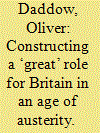

|
|
|
|
|
| Summary/Abstract |
This article interprets the ideational underpinnings of the British Conservative–Liberal coalition government’s foreign policy from 2010 to 2015. It uses qualitative discourse analysis of speeches, statements and policy documents to unpack the traditions of foreign policy thought which informed some of the key foreign policy practices of the coalition government. The analysis centres on the British identity constructed by liberal Conservatives, and the values and interests flowing from this baseline identity that the government’s foreign policy sought to express through its foreign policy. Liberal Conservative foreign policy is argued to have been an attempt to come to terms with the limits on Britain’s international agency in the face of three major foreign policy dilemmas: the legacy of the New Labour years, dramatically reduced economic resources in the ‘age of austerity’ and an increasingly restricted capacity for Britain to exercise ideational entrepreneurship in the international community. The article substantiates the claim in the extant literature that liberal Conservatism significantly adapted but did not restructure an established British foreign policy tradition of merging values and interests in complex ways.
|
|
|
|
|
|
|
|
|
|
|
|
|
|
|
|
| 2 |
ID:
141732


|
|
|
|
|
| Summary/Abstract |
This article investigates the Franco-British rapprochement in security and defence cooperation under Nicolas Sarkozy, Gordon Brown and David Cameron from 2008 to 2012. While in the past British Atlanticism and the French Europeanist tradition had stood in the way of close bilateral cooperation, the conclusion of several treaties of defence cooperation in this period delivered closer ties. By adopting an interpretivist perspective on events, this article argues that the rapprochement can be explained with reference principally to changes in the French tradition, which took it closer to the British Atlanticist tradition. Drawing on parliamentary and executive statements, the article traces the influence of, and changes in, the balance between Europeanism and Atlanticism in the defence policy traditions in the two countries. The article argues that the dilemmas that compelled a revision of the traditions particularly in France arose from a series of new beliefs at elite level about sovereignty over defence policy, national role conceptions and the recognition of dire budgetary constraints. In this context, Franco-British rapprochement served both countries’ national interests.
|
|
|
|
|
|
|
|
|
|
|
|
|
|
|
|
| 3 |
ID:
141729
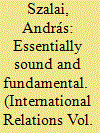

|
|
|
|
|
| Summary/Abstract |
Faced with the strategic uncertainties of the early nuclear age, the US Air Force (USAF) turned to civilian experts (defense rationalists) for help. Although the two communities shared the perception that science-based policies were required, the marriage of two distinct traditions – military and scientific – was not without conflict. Using an interpretivist approach, this article investigates this problematic reconciliation. It construes the realm of nuclear strategy-making as an interpretive enterprise where a multitude of ideas competed. Experts in this environment influenced policy decisions by rendering their ideas persuasive for their military ‘patrons’ through narrative framing devices. Within this conceptualization, bureaucratic dilemmas faced by the patron offered opportunities for experts to establish metaphorical correspondence between their tradition and the patron’s tradition. Such correspondence then lent ideas legitimacy and encouraged organizational support. As an illustration, an analysis is conducted on the role that hallmark RAND ideas on war limitation played in the so-called ‘counterforce’ debate in the early 1960s. This case suggests that the lasting impact of deterrence ideas had less to do with their correspondence to reality, than with their versatility as carriers of constructed ‘scientific’ and ‘rational’ storylines that gained traction within the USAF.
|
|
|
|
|
|
|
|
|
|
|
|
|
|
|
|
| 4 |
ID:
141736
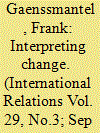

|
|
|
|
|
| Summary/Abstract |
This article examines why and how China upgraded its engagement with the European Union (EU) in the years between 2001 and 2004, with reference to pre-existing foreign policy traditions and practices in reform-era China. It argues that most of the observed changes can be explained with reference to two dynamics. First, the changing international environment, mostly with regard to the roles of the United States and the EU, challenged the established approach to foreign policy inherited from Deng Xiaoping, China’s pre-eminent leadership figure from the late 1970s to the mid-1990s. In this sense, the shift towards the EU was part of wider efforts to solve this dilemma. Second, differences in how various groups in the Chinese foreign policy establishment understood and implemented Deng’s guidelines and their respective influence in policy-making can help to grasp some of the more specific developments in Chinese policy towards the EU in the early 2000s. To supplement this main claim, the article also critically evaluates the changes less well explained by these two dynamics and proposes additional explanations.
|
|
|
|
|
|
|
|
|
|
|
|
|
|
|
|
| 5 |
ID:
141728
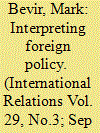

|
|
|
|
|
| Summary/Abstract |
This Special Issue advances an interpretive research programme into Foreign Policy Analysis (FPA) and International Relations by showcasing new work on the study of foreign policy and regional cooperation. This introductory article explains the rationale and contents of the Special Issue in three parts. The opening part explains how the contributions complement the broader study of ideas in FPA and International Relations through a critique of methodological positivism in the social sciences. The second part elaborates the theoretical framework used to cohere the collection, which centres on the study of ‘situated agents’ who, when confronted with policy dilemmas, draw on inherited traditions to inform their foreign policy practices. This is accompanied by a methods case study centring on David Cameron’s European Union referendum strategy, which is used to illustrate the practical ways in which one can conduct interpretivist research into foreign policy. In conclusion, we spell out how the contributors conducted their work to advance the interpretivist research programme.
|
|
|
|
|
|
|
|
|
|
|
|
|
|
|
|
| 6 |
ID:
141734
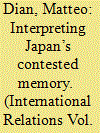

|
|
|
|
|
| Summary/Abstract |
This article applies an interpretive approach to account for the process of definition and contestation over wartime memory in Japan. It first locates the role of memory in interpretive theory, emphasising how beliefs about the past are a crucial component of foreign policy traditions. Second, it highlights how the process of contestation over a country’s memory is fundamentally intertwined with attempts to legitimise or resist key foreign policy decisions in response to contemporaneous dilemmas that force a confrontation with historical traditions. This is illustrated through an analysis of the Yoshida Doctrine’s problematic compromise between conservative and progressive traditions of thought about Japan’s role in the Second World War, beginning with the period of US Occupation, moving through the Cold War years and ending with the death of the Shōwa Emperor in 1989. Finally, it studies the ‘normalisation’ of Japanese foreign policy during the post-Cold War Heisei period, the dilemmas caused by the debate over wartime memory and the effort to achieve reconciliation with other Asian nations. The central argument is that post-war Japanese foreign policy has generally represented an uneasy and evolving compromise between the conservative and progressive traditions.
|
|
|
|
|
|
|
|
|
|
|
|
|
|
|
|
| 7 |
ID:
141731
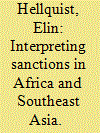

|
|
|
|
|
| Summary/Abstract |
The Organization of African Unity (OAU) and the Association of Southeast Asian Nations (ASEAN) were both born to stabilise vulnerable state borders by practising non-interference in domestic affairs. Today, the OAU’s successor, the African Union (AU), uses sanctions against unconstitutional changes of government, while ASEAN continues to rule out any collective punitive action against members. To explain these divergent trajectories, this article first shows how different traditions produced different ways of engaging with sanctions in the early formative cases of South Africa and Vietnam. Thereafter, it examines how these traditions were selectively re-thought when confronted with the dilemmas of international sanctions against Libya and Myanmar. The interpretive approach enables a nuanced account of continuity and change in beliefs about sanctions. The AU’s sanctions doctrine has updated rather than broken with a traditional interpretation of non-interference. For ASEAN, the longstanding tradition of informality – and not strict adherence to non-interference – has continued to rule out regional sanctions.
|
|
|
|
|
|
|
|
|
|
|
|
|
|
|
|
| 8 |
ID:
141733
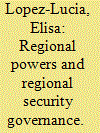

|
|
|
|
|
| Summary/Abstract |
The study of regional powers has become an increasingly prominent part of debates in the academic field of International Relations (IR), particularly regarding their role in creating the conditions for international security. While the IR literature tends to focus on the causal effect of material and ideational factors to explain the policy of regional powers, this article uses an interpretive approach, centring on the study of historical representations. Through a comparative analysis of the foreign policies of Brazil and Nigeria since the 1990s, it argues that a focus on the traditions and dilemmas of regional powers enables a better explanation of their policy, one which illustrates how material factors are refracted through the representations of foreign policy elites in the two countries and expressed in their foreign policy practices as regional powers.
|
|
|
|
|
|
|
|
|
|
|
|
|
|
|
|
| 9 |
ID:
141735
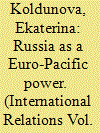

|
|
|
|
|
| Summary/Abstract |
Russia has a dual self-perception deeply rooted in its historical development. It is represented in two competing traditions of defining Russia’s position in the world. While some parts of society view Russia as a part of Europe, others believe that it is a distinct Eurasian power. An academic view – although one less popular among Moscow foreign policy-making elites – defines Russia as a Euro-Pacific power possessing vital interests in Europe and the Asia-Pacific. This article examines recent developments in Russian foreign policy decision-making with a view to interpreting how contemporary dilemmas have featured in the adaptation and rearticulation of the two predominant identity traditions by Russian foreign policy actors since 1991. It also analyses how the beliefs of the situated agents, namely, political elites and bureaucratic, intellectual and business actors at various levels, have contributed to Russia’s interpretation of recent global power shifts. These are examined with particular reference to the ongoing crisis in Russia’s relations with the West, sharply accented in Ukraine, and the emerging significance of the Asia-Pacific for thinking about the Russian foreign policy and its role in the world.
|
|
|
|
|
|
|
|
|
|
|
|
|
|
|
|
|
|
|
|
|